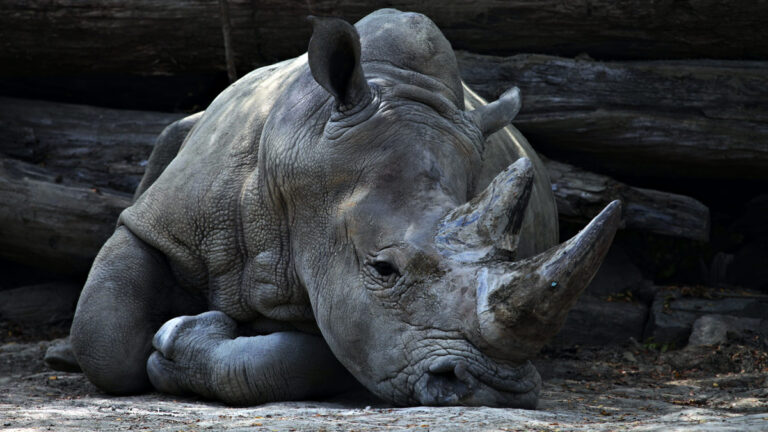Embracing cryptocurrency to protect South Africa’s endangered animals

In South Africa, both the government and private conservation entities have been grappling with the unprecedented rate of animal poaching, which has led to a section of them being classified as endangered species. Out of an estimated 29,000 rhinos in the world, 80 per cent are in South Africa, making it a key nation in rhino conservation efforts.
But the country has had to contend with alarming cases of poaching, with poachers becoming more lethal and sophisticated by using powerful guns. So serious was the situation between 2013 and 2017, that over 1,000 rhinos were poached every year. Their horns are sold in Asian countries where demand has been on a steady rise due to their purported medicinal value.
To protect the endangered animals, both government and private players have had to spend millions of dollars in surveillance and modern equipment which has been credited with the falling numbers of poached animals. In 2020, 394 rhinos were poached, representing a 33 per cent decline compared to the 594 killed in 2019.
According to the Private Rhino Owners Association, private reserves spent approximately 2 billion rands ($140 million) between 2009 and 2017 in various animal protection projects.
These included miles of electric fences, helicopters and aircraft for surveillance, deploying highly trained rangers with grenade launchers and automatic rifles, cameras, listening devices to locate poachers and military grade radar.
Kruger National Park, which is located in northeastern South Africa and is one of the largest African game reserves and home to rhinos, elephants, buffalos, lions and leopards, spends more than $13.5 million each year on various anti-poaching programmes. It has invested in dog tracker packs, helicopters and support from South Africa defence forces, and employs the most highly trained anti-poaching force in Africa.
To ensure dedicated animal protection, Kruger National Park has divided the land into 22 sections. A ranger and a team of field rangers are responsible for each section. Yet even with this elaborate security detail, the park had lost 327 rhinos in 2019 and 421 in 2018.
South Africa’s 330 private rhino owners, who are responsible for caring for over 7,000 rhinos, have voiced their concerns over the high cost of protecting the endangered animals.
Tech to the rescue
As both government and private players explore innovative and sustainable ways of boosting wildlife conservation, a group of techies and environmentalists are embracing blockchain and cryptocurrency in a model that seeks to reward investors while committing the proceeds to conservation projects across South Africa.
Wildcards, the company behind the initiative, has explored unique ways to disrupt modern conservation space and has raised $125,000 (about £88,500) for conservation over the last year and a half.
Through Ethereum, a digital public transaction ledger, those keen to invest in conservation get a chance to become guardians of any of the endangered animals, learn about the profile of the endangered animals and choose which species they would want to be guardians of.
A wildcard represents a digital version of an animal with the guardian committing a monthly donation in order to continue being the guardian of the digital animal. These donations are then sent as Ether coins to the digital wallets of various conservation projects. Adopting the Harberger tax model, the platform allows the guardian to decide the amount that another user needs to pay for them to become the new guardian of the specific endangered species. When a new guardian buys the animal wildcard at the price specified by its previous guardian, they will take over paying the monthly donation (which is a proportion of the price the new guardian is willing to sell the wildcard for).
The platform developed three digital hyena wildcards in partnership with ecologists from the Wild Tomorrow Fund in order to support the MunYaWana Spotted Hyena Project, which has embraced GPS collar technology to tame the dwindling hyena population in northern KwaZulu Natal.
“At Wild Tomorrow Fund, we believe that innovative technologies such as blockchain and cryptocurrencies have the potential to connect new audiences to conservation, changing how we interact with and join together as a global community to protect our planet’s precious biodiversity,” Wendy Hapgood, Wild Tomorrow Fund’s co-founder and COO, said in a statement.
The crypto-backed conservation fundraising platform has been hailed as transformative for being transparent and auditable by allowing any investor track where their investment is being directed to while eliminating the number of players involved in the transactions, therefore facilitating a speedy donation process. The prompt payment by donors from any part of the world has reduced the high cross-border transaction fees.
Wildcards is one of the many disruptive conservation models being rolled out as governments, private sector players and development partners navigate innovative strategies that reward investors, while positioning conservation as a worthy investment that individuals and companies can embrace and earn from shifting the focus from the traditional model that has been a preserve of governments and philanthropists.
The World Bank recently announced the sale of a five year 670 million rand ($45 million) bond meant to raise funds to boost the population of South Africa’s endangered black rhinos.
The first-of-its-kind global wildlife conservation bond, which will be sold over the course of this year, will give conservation investors a chance to earn from their investment and re-invest their earnings in other projects of their choice.
Investors’ returns will hinge on population growth of the animals in two South African reserves.
This article has been published as part of an ongoing content partnership with FAIRPLANET.




